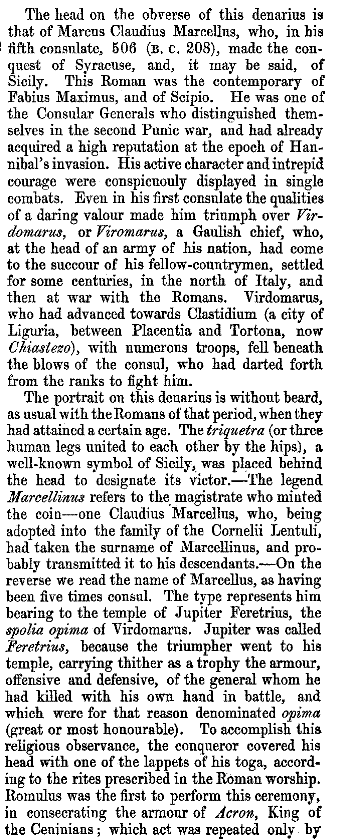Claudia
            | Please |help| us convert the |Dictionary of Roman Coins| from scans to text by typing the original text here. Please add updates or make corrections to the NumisWiki text version as appropriate. CLAUDIA gens—a duplex family, i.e. of patrician as well as plebeian rank, sprung from the Sabines.—Atta Clausus, the head of this hous, a man of distinction, having been driven from Regillus by a seditious faction, came to Rome, followed by all his clients, to whom the republic granted the rights to citizenship. Clausus, who afterwards took the name of Appius Claudius, was admitted into the order of Patricians and to the rank of Senator. Afterwards, having been made consul, he left an illustrious name to his descendants, who sustained it with honour. The surnames of this family were Centho, Crassus, Glicia, Marcellus, Nero, Pulcher. The surname of Nero follows the prenomen of Drusus. The Patricians formed four branches, of whom coins are extant. The most distinguished members of the Plebeian branch were surnamed Marcellus. Each produced great men who rendered good service to the state. The Emperor Nero was the last and certainly the least worthy of its public characters. The prenomen of Appius was the one which the Claudia family appropriated to itself; whilst it repudiated that of Lucius. Amongst the coins (comprising 43 varieties) which refer to his family are the following:— 1. Obv.—MARCELLINVS. Male head, beardeless, to the right. Behind it the triquetra. Rev.—MARCELLVS. COS. QVINQ. Marcellus consul quinquies. A figure togated and veiled, bearing a warlike trophy, as if about to mount the steps of a temple. |
View whole page from the |Dictionary Of Roman Coins|
Claudia
            | Please |help| us convert the |Dictionary of Roman Coins| from scans to text by typing the original text here. Please add updates or make corrections to the NumisWiki text version as appropriate. CLAUDIA gens—a duplex family, i.e. of patrician as well as plebeian rank, sprung from the Sabines.—Atta Clausus, the head of this hous, a man of distinction, having been driven from Regillus by a seditious faction, came to Rome, followed by all his clients, to whom the republic granted the rights to citizenship. Clausus, who afterwards took the name of Appius Claudius, was admitted into the order of Patricians and to the rank of Senator. Afterwards, having been made consul, he left an illustrious name to his descendants, who sustained it with honour. The surnames of this family were Centho, Crassus, Glicia, Marcellus, Nero, Pulcher. The surname of Nero follows the prenomen of Drusus. The Patricians formed four branches, of whom coins are extant. The most distinguished members of the Plebeian branch were surnamed Marcellus. Each produced great men who rendered good service to the state. The Emperor Nero was the last and certainly the least worthy of its public characters. The prenomen of Appius was the one which the Claudia family appropriated to itself; whilst it repudiated that of Lucius. Amongst the coins (comprising 43 varieties) which refer to his family are the following:— 1. Obv.—MARCELLINVS. Male head, beardeless, to the right. Behind it the triquetra. Rev.—MARCELLVS. COS. QVINQ. Marcellus consul quinquies. A figure togated and veiled, bearing a warlike trophy, as if about to mount the steps of a temple.
The head on the obverse of this denarius is that of Marcus Claudius Marcellus, who, in his fifth consulate, 506 (B.C. 208), made the conquest of Syracuse, and, it may be said, of Sicily. This Roman was the contemporary of Fabius Maximus, and of Scipio. He was one of the Consular Generals who distinguished themselves in the second Punic war, and had already acquired a high reputation at the epoch of Hannibal's invasion. His active character and intrepid courage were conspicuously displayed in single combats. Even in his first consulate the qualities of a daring valour made him triumph over Virdomarus, or Viromarus, a Gaulish chief, who, at the head of an army of his nation, had come to the succour of his fellow-contrymen, settled for some centuries, in the north of Italy, and then at war with the Romans. Virdomarus, who had advanced towards Clastidium (a city of Liguria, between Placentia and Tortona, now Chiastezo), with numerous troops, fell beneath the blows of the consul, who had darted forth from the ranks to fight him. |
View whole page from the |Dictionary Of Roman Coins|